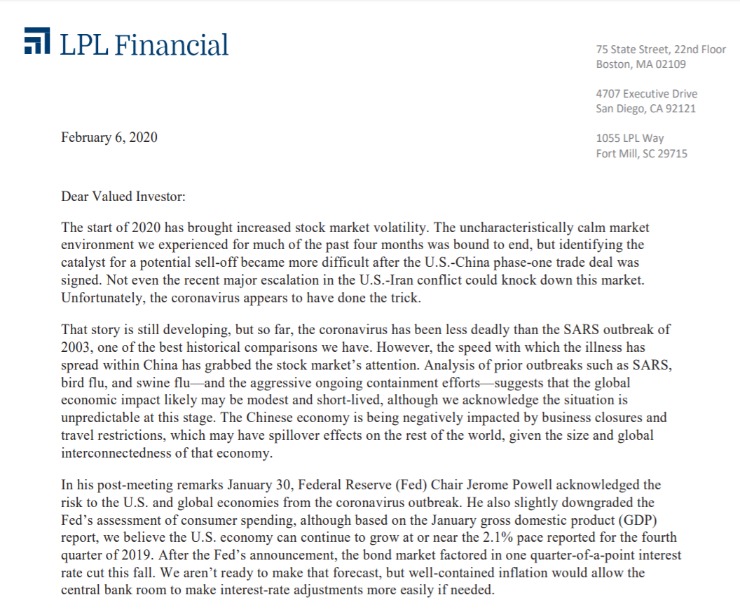The start of 2020 has brought increased stock market volatility. The uncharacteristically calm market environment we experienced for much of the past four months was bound to end, but identifying the catalyst for a potential sell-off became more difficult after the U.S.-China phase-one trade deal was signed. Not even the recent major escalation in the U.S.-Iran conflict could knock down this market. Unfortunately, the coronavirus appears to have done the trick.
That story is still developing, but so far, the coronavirus has been less deadly than the SARS outbreak of 2003, one of the best historical comparisons we have. However, the speed with which the illness has spread within China has grabbed the stock market’s attention. Analysis of prior outbreaks such as SARS, bird flu, and swine flu—and the aggressive ongoing containment efforts—suggests that the global economic impact likely may be modest and short-lived, although we acknowledge the situation is unpredictable at this stage. The Chinese economy is being negatively impacted by business closures and travel restrictions, which may have spillover effects on the rest of the world, given the size and global interconnectedness of that economy.
In his post-meeting remarks January 30, Federal Reserve (Fed) Chair Jerome Powell acknowledged the risk to the U.S. and global economies from the coronavirus outbreak. He also slightly downgraded the Fed’s assessment of consumer spending, although based on the January gross domestic product (GDP) report, we believe the U.S. economy can continue to grow at or near the 2.1% pace reported for the fourth quarter of 2019. After the Fed’s announcement, the bond market factored in one quarter-of-a-point interest rate cut this fall. We aren’t ready to make that forecast, but well-contained inflation would allow the central bank room to make interest-rate adjustments more easily if needed.
The fundamentals of the U.S. economy and stock market—interest rates, inflation, wage growth, and jobs—still appear favorable overall. Although S&P 500 Index companies have reported minimal earnings growth during fourth-quarter earnings season, commentary from corporate America over the past several weeks has helped solidify the outlook for corporate profits in 2020. We continue to believe profits could be the primary driver of any potential stock market gains over the next 11 months.
More broadly, we expect fundamentals to help support stocks over the balance of the year, though the magnitude of potential gains from current levels may be limited. In addition, there are some risks to consider beyond those already mentioned: The 2020 election could negatively impact certain segments of the market due to policy uncertainty; the United Kingdom will officially leave the European Union at the end of this year; and trade tensions with China could flare up again.
Bottom line, there will be some bumps in the road, but we continue to expect the economic expansion to continue through 2020 and help power forward this nearly 11-year-old bull market.
As always, if you have any questions, I encourage you to contact your trusted financial professional.
Click here to download a PDF of this report.
This material is for general information only and is not intended to provide specific advice or recommendations for any individual. There is no assurance that the views or strategies discussed are suitable for all investors or will yield positive outcomes. Investing involves risks including possible loss of principal. Any economic forecasts set forth may not develop as predicted and are subject to change.
References to markets, asset classes, and sectors are generally regarding the corresponding market index. Indexes are unmanaged statistical composites and cannot be invested into directly. Index performance is not indicative of the performance of any investment and do not reflect fees, expenses, or sales charges. All performance referenced is historical and is no guarantee of future results.
All information is believed to be from reliable sources; however, LPL Financial makes no representation as to its completeness or accuracy.
This research material has been prepared by LPL Financial LLC.
Securities and advisory services offered through LPL Financial (LPL), a registered investment advisor and broker-dealer (member FINRA/SIPC).
Insurance products are offered through LPL orits licensed affiliates. Tothe extent you are receiving investment advice from a separately registered independent investment advisor that is not an LPL affiliate, please note LPL and makes no representation with respect to such entity.
If your advisor is located at a bank or credit union, please note that the bank/credit union is not registered as a broker-dealer or investment advisor. Registered representatives of LPL may also be employees of the bank/credit union. These products and services are being offered through LPL or its affiliates, which are separate entities from, and not affiliates of, the bank/credit union. Securities and insurance offered through LPL or its affiliates are:
Not Insured by FDIC/NCUA or Any Other Government Agency | Not Bank/Credit Union Guaranteed
Not Bank/Credit Union Deposits or Obligations | May Lose Value
Tracking #1-946762 (Exp. 02/21)
